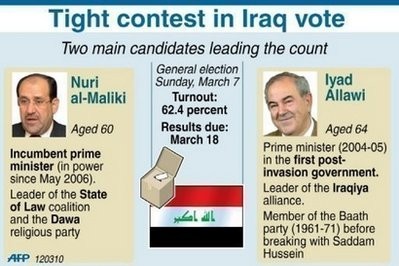Iraqi Prime Minister Nuri al-Maliki's bloc looked likely to form parliament's single largest grouping Tuesday, after results showed the incumbent had strengthened his hold on key Baghdad province.

Maliki's success in the capital, which accounts for more than twice as many seats as any other province, builds on his lead in seven provinces overall, and is a major boost for his bid to retain the top job.
Maliki's main rival, secular ex-premier Iyad Allawi, leads in five provinces, with two-thirds of votes having been counted nationwide.
The election -- the second since Saddam Hussein was ousted in the US-led invasion of 2003 -- comes less than six months before the United States is set to withdraw all of its combat troops from Iraq.
Preliminary results, based on 60 percent of ballots counted in Baghdad, showed Maliki's State of Law Alliance held a 65,000-vote lead over Allawi's Iraqiya bloc with the Iraqi National Alliance (INA), a coalition of Shiite religious groups, a distant third.
Maliki, a Shiite who has sought to portray himself as the man who restored Iraq's security, also holds leads in the oil-rich province of Basra, the third-biggest in Iraq, as well as five other predominantly Shiite provinces south of Baghdad.
Despite the State of Law's success, however, analysts have cautioned that rival political groupings could still manoeuvre to form a coalition government without it.
While the State of Law has said it has established a committee to enter talks with blocs to form a government, Intisar Allawi, a senior Iraqiya candidate, said on Monday the grouping had held its own talks with the INA and the main Kurdish bloc, which she described as "very good and positive."
Iraq's proportional representation system makes it unlikely that any single group will clinch the 163 seats needed to form a government on its own, and protracted coalition building is likely.
Opposition groups have alleged fraud in the election and the count, but Maliki dismissed the claims in televised remarks to Iraq's National Security Council broadcast late on Sunday, his first public appearance since his office announced on Thursday that he had undergone surgery for an unspecified ailment.
Election officials have also downplayed allegations of fraud.
Faraj al-Haidari, head of the national election commission, told reporters the number of complaints in the general election was less than half those filed during provincial polls in January 2009.
Vote tallies have so far been released to chaotic scenes at the commission's data entry centre in Baghdad's Green Zone, with several provinces often published at once onto a single television screen, usually leaving some out of view, sparking shouts of anger from assembled journalists and observers.
Figures released on Monday showed Allawi, a Shiite Arab like Maliki, was narrowly ahead in the northern oil province of Kirkuk, defying predictions of a win for the Kurdish bloc which wants to incorporate Kirkuk into autonomous Iraqi Kurdistan in the north.
Iraqiya is also leading in Nineveh, Iraq's second-largest province around the main northern city of Mosul, as well as the mostly Sunni provinces of Anbar, Diyala and Salaheddin.
The INA, meanwhile, is ahead in three Shiite southern provinces while Kurdistania, an alliance of the two main Kurdish former rebel factions, was ahead in all three of Kurdistan's provinces.
Security officials have expressed concern a lengthy period of coalition building could give insurgent groups and Al-Qaeda an opportunity to further destabilise Iraq.
Their worries were illustrated when a double-blast suicide bomber targeting a military checkpoint and labourers killed eight people and wounded 28 other civilians on Monday, in Fallujah in Anbar province.
























